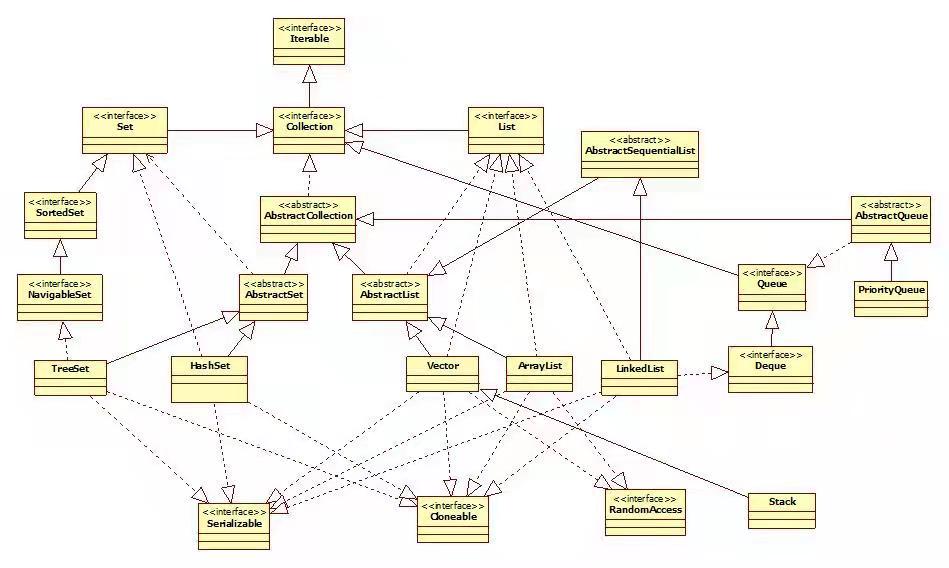集合之ArrayList
ArrayList继承AbstractList抽象类
AbstractLis抽象类继承AbstractCollection抽象类并实现了List接口
AbstractCollection和List都实现了Collection接口

一、ArrayList常用方法
- add(Object o)方法,用于向list集合容器之中添加元素。
- add(int index,Object o)方法,在指定位置添加元素,原来位置的元素后置。
- addAll(Collection c)方法,用于将集合c中的所有元素都添加到列表中。
- addAll(int index,Collection c),index用于指定Collection的第一个元素所插入位置的索引。
- size()方法,用于获取集合中有多少个元素。
- get(int index)方法,获取指定索引(从0开始)位置的元素。
- clear()方法,清空List集合中的所有元素。
- isEmpty()方法,判断集合容器有没有元素。
- contains(Object o)方法,用来判断集合容器中是否含参数元素。
- containsAll(Collection<?> c)方法,判断是否包含参数集合的所有元素。
- remove(Objiect o)方法,删除List集合元素,返回boolean,并让后面元素前移。
- remove(int index)方法,移除此列表中指定位置的元素。
- set(int index,Object o)方法,替换指定位置的元素。
- sort()方法,用于列表排序,必要时重写Comparable接口中的方法。
二、ArrayList部分方法实现
1.add(Object o)
1 public boolean add(Object o) { 2 ensureCapacityInternal(size + 1); // 扩容 3 elementData[size++] = o; 4 return true; 5 }
将指定元素附加到此列表的末尾,ensureCapacityInternal判断是否要扩容,变成原来最大容量的1.5倍+1。
2.add(int index,Object o)
1 public void add(int index, Object o) { 2 rangeCheckForAdd(index); //范围检查 3 4 ensureCapacityInternal(size + 1); 5 System.arraycopy(elementData, index, elementData, index + 1, 6 size - index); //将指定源数组中的数组从指定位置开始复制到目标数组的指定位置 7 elementData[index] = o; 8 size++; 9 }
在此列表中的指定位置插入指定元素。将当前位于该位置的元素(如果有)和任何后续元素向右移动(将其索引加一)。
3.remove(int index)
1 public Object remove(int index) { 2 rangeCheck(index); 3 4
5 Object oldValue = elementData(index); 6 7 int numMoved = size - index - 1; 8 if (numMoved > 0) 9 System.arraycopy(elementData, index+1, elementData, index, 10 numMoved); 11 elementData[--size] = null; 12 13 return oldValue; 14 }
移除此列表中指定位置的元素。将任何后续元素向左移动(从它们的索引中减去 1)。
4.remove(Object o)
1 public boolean remove(Object o) { 2 if (o == null) { 3 for (int index = 0; index < size; index++) 4 if (elementData[index] == null) { 5 fastRemove(index); 6 return true; 7 } 8 } else { 9 for (int index = 0; index < size; index++) 10 if (o.equals(elementData[index])) { 11 fastRemove(index); 12 return true; 13 } 14 } 15 return false; 16 }
从此列表中删除第一次出现的指定元素(如果存在)。如果列表不包含该元素,则它不变。
5.contains(Object o)
1 public boolean contains(Object o) { 2 return indexOf(o) >= 0; 3 } 4 5 public int indexOf(Object o) { 6 if (o == null) { 7 for (int i = 0; i < size; i++) 8 if (elementData[i]==null) 9 return i; 10 } else { 11 for (int i = 0; i < size; i++) 12 if (o.equals(elementData[i])) 13 return i; 14 } 15 return -1; 16 }
如果此列表包含指定元素,则返回 true。
6.clear()
1 public void clear() { 2 3 for (int i = 0; i < size; i++) 4 elementData[i] = null; 5 6 size = 0; 7 }
从此列表中删除所有元素。此调用返回后,列表将为空。


 浙公网安备 33010602011771号
浙公网安备 33010602011771号